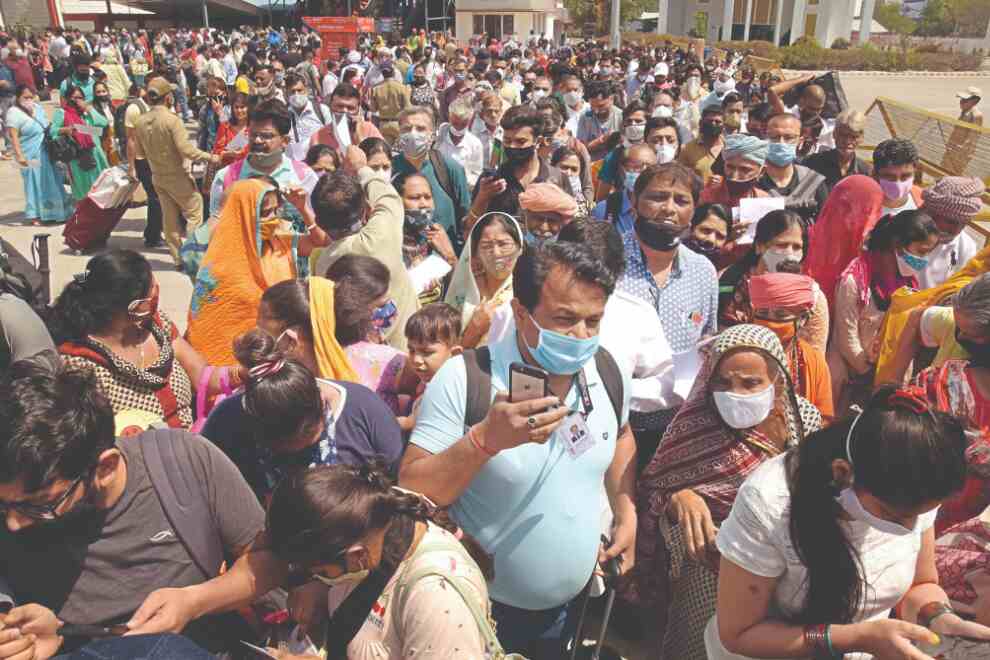Thousands arriving from Kumbh fell off radar as O2 crisis consumed govt

New Delhi: Throughout April, Delhi dealt with one of its worst-ever Covid-19 waves — one that was nearly four times more vicious than the previous biggest wave in November. Soon, one after the other, the Capital battled an acute shortage of first medicines, then beds and then oxygen as people in the city kept dying outside hospitals and crematoria and burial grounds kept overflowing.
And throughout April, the Delhi government failed to track and test the trains and busloads of people returning from Haridwar after attending the Kumbh Festival — declared one of the biggest super-spreader events behind India's ferocious second wave by many global experts.
While the Delhi Disaster Management Authority had issued a directive in a bid to trace Kumbh returnees on April 17, the system set up by the authorities has yielded no results, according to multiple officials in the Delhi government and district officials.
The DDMA had ordered everyone visiting Kumbh and returning to Delhi between April 4 and April 30 to mandatorily upload their travel and contact details on a government website. The order added that these people would have to quarantine at home mandatorily for 14 days upon their return.
The DDMA had added that anyone found not complying would be institutionally quarantined for two weeks and could be prosecuted under the relevant sections of the Disaster Management Act.
Millennium Post has now learned that not a single Delhi resident who returned to the city from Kumbh has uploaded their details on the designated website, according to information from several government officials who refused to be named as they are not authorised to speak publicly on the matter.
In addition to this, the Delhi government had said that it would be coordinating with its counterparts in the Uttarakhand government to get a list of those from Delhi attending the festival — as a backup. One senior official said that as per this list, only a little over 150 people from Delhi had attended the Kumbh and returned in this time period, of which 25 were in the North-West district.
"There is no way of knowing the exact number of people who have returned as several people would have taken the bus or their private vehicles. Data on few people could be recorded as they had travelled by trains or flights. Those that took the road route we have no record of it," one senior official of the Delhi government said.
A senior district official said that the returnees that were traced from the Uttarakhand government's list, were monitored and advised to quarantine at home by each district. But they are not being tested by the Delhi government. "If they have individually tested themselves then that is another thing and neither do we have data on that," an official in one of the district administrations said.
As for the rider that those who fail to mandatorily report themselves would face institutional quarantine and legal action, the senior Delhi government official quoted above said that no such action had been taken as their records have not been maintained properly. "We have been struggling with oxygen supply and ICU beds which are more important and required undivided attention," the official said.
The first time the Delhi government mentioned the impact of Kumbh on Delhi's brutal fourth wave was when Health Minister Satyendar Jain last week said that the city saw extra cases during this wave because many were coming from the rural outskirts and said that the reason for this was that many had attended the Kumbh festival.
"In the previous three waves that Delhi faced, we hardly saw any covid cases coming from the villages in the countryside. But in this wave, we have seen a number of cases. The entire nation is in fact tackling the spread in rural areas. It is being widely told that the reason behind this spread in villages and rural areas has been Kumbh Mela wherein people went in large numbers," he said.
This failure to trace and test attendees of a super-spreader event, however, stands in contrast to the way the Delhi government reacted to a similar but smaller super-spreader event in Delhi last year at the Nizamuddin Markaz. At the time, Chief Minister Arvind Kejriwal had said, "Will give police phone numbers of Tablighi Jamaat event attendees to trace, ascertain whether they moved in nearby areas."
After tracing most of them to one location, over 3,000 attendees of the event were institutionally quarantined till they completed their 28-day quarantine, after which legal proceedings were initiated only against those members who had travelled from other countries and the Indian attendees were let go.
Official spokespersons of the Delhi government are yet to respond to repeated questions for this story.



